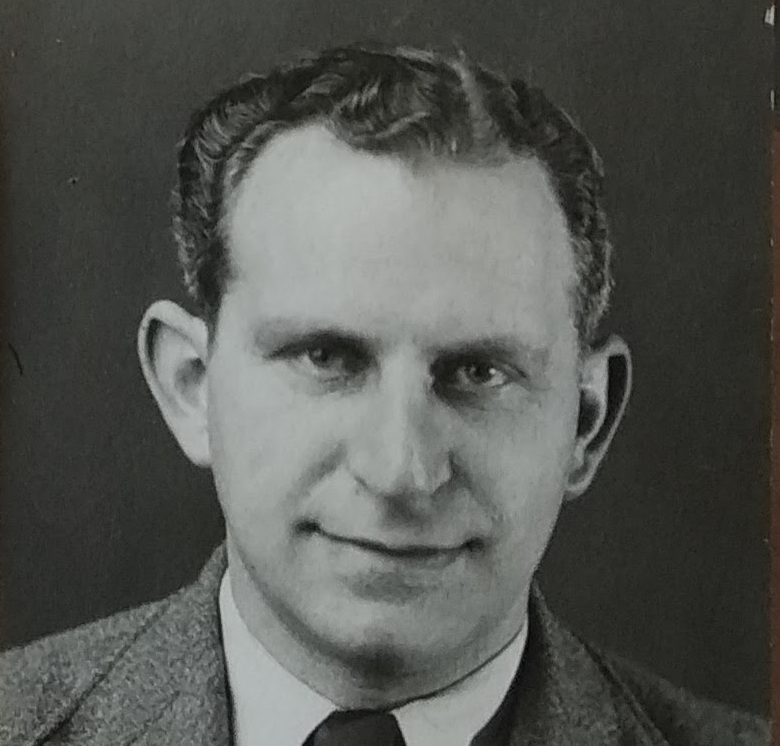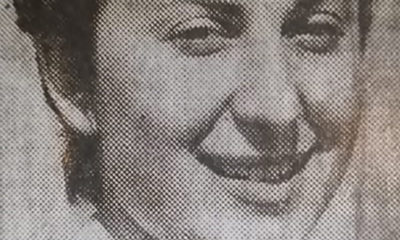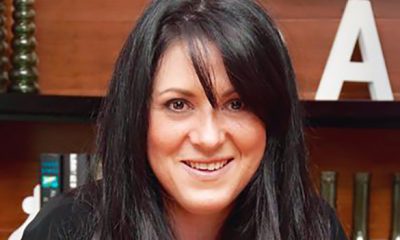
Featured Item

Unsung hero who fought fascism, racism revealed in son’s book
Published
3 years agoon
By the time Jock Isacowitz died in his mid-forties, he had achieved more than a whole team of people would in their lifetime.
He fought in World War II as part of South Africa’s forces in East and North Africa, and chaired an organisation for soldiers’ rights. He also joined and then later left the Communist Party, and was a founding member of the Liberal Party. He became a leader of the South African Jewish Board of Deputies (SAJBD), and worked with refugees in Europe and migrants in Israel. Over and above all that, he got arrested in the wake of the Sharpeville massacre, and died of leukaemia a year after his release from prison.
For his son, Roy, who was just 10 at the time of his father’s death, this extraordinary life and legacy lay dormant but ever present. It was an undiscovered but powerful influence that was largely forgotten by the historical record.
Sixty years later, he decided to explore and record his father’s life and times in a book,Telling People What They Don’t Want to Hear: A Liberal Life Under Apartheid.
“Had he stayed on in the resistance, the name Jock Isacowitz would have become as famous as Arthur Goldreich, Harold Wolpe, Ruth First, Ray Alexander, and Denis Goldberg,” former Constitutional Court Justice and struggle stalwart Albie Sachs told the SA Jewish Report.
So for Roy, a journalist by profession, “this book is something I had to do. It’s one of those things that if you don’t do, it makes you anxious. I’ve known ever since I was in my 20s, but it took me another 40 years to write it. I felt I owed it to him, and also because he deserves to be better known.
“Most people don’t know much about that history of white non-parliamentary opposition to nationalism in the 1940s and 1950s. So the book is part biography, part memoir and history of a relatively unknown period,” Roy says.
He explains that his father’s father was born in South Africa, but his parents were from Lithuania. His father’s mother was also born in South Africa, but her parents came from England and Lithuania. His father was an ex-Bundist, and his mother was a Zionist, but it wasn’t a particularly radical household.
Jock was a pharmacist by trade and “a politician by nature”.
“That was what he put his heart into,” says Roy. “In 1940, South Africa joined the war. Jock volunteered along with 400 000 other South Africans of all races to fight fascism, and served in East and North Africa. He and others became activists for ex-servicemen’s rights. He was the founder and chairperson of the Springbok Legion, a veterans’ organisation that was profoundly anti-racist. This was where people like Bram Fischer and Joe Slovo cut their teeth as activists.
“It’s fascinating that while South Africa was fighting the Nazis, fascism was developing at home in many purely Nazi organisations,” says Roy.
Says Sachs, “Jock deserves to be remembered as part of an extremely brave group of people who fought against the racism of Hitler and Mussolini ‘up North’, and then fought against the racism of apartheid South Africa.”
He also joined the Communist Party and declared himself an atheist, but later took an equally strong stand by leaving the party in light of Stalin’s atrocities. Horrified by the Holocaust, he went from being anti-Zionist to joining a Zionist socialist organisation.
“He was chosen to be a delegate on the national executive of the SAJBD. He was sent on missions to displaced persons camps in Europe and absorption centres in Israel. He was a leading member of the Liberal Party, and was arrested in the state of emergency after the Sharpeville massacre,” says Roy.
On his death in 1962, Peter Brown wrote about the crucial role Jock played at this time. “To say that his death leaves a gap in the ranks of the Liberal Party would be an unforgivable understatement. Jock attended the meeting in Cape Town at which the Liberal Party was launched. There were people at that meeting who had doubts about whether a new political party should be formed, but Jock had none. He was convinced of the need at that moment in 1953, just after the Nationalists had won their second election victory, for a non-racial party.
“The contribution which Jock Isacowitz made towards building the Liberal Party probably outweighs anything any other individual has done. He served us in many capacities – as Transvaal chairperson, as national vice-chairperson, as a brilliant organiser, an outstanding conference chairperson, a most perceptive political student, an incisive debater, a warm friend and, even on the darkest days, an inveterate optimist.
“The government recognised Jock Isacowitz for what he was – an opponent to be respected. So it banned him from all meetings for two years and, when the 1960 emergency came, it put him in gaol for three months. We cannot replace Jock. All we can do is try to emulate his example.”
For Roy, he recalls how “we knew they were coming for my father. It was the first time I learned of the word ‘contraband’, and we spent three days burning books and pamphlets in the stove. When they came, they searched the house all night. I thought it was very funny when a cop searched my sister’s school satchel and his hand got covered with apricot jam from her sandwiches. By the time they left the house, it was light. He kissed us, and walked off. In prison, he was with Joe Slovo, Harold Wolpe, Rusty Bernstein … all the people who figured in the struggle later on.”
The rest of his memories of that time are blurry, but Sachs says, “I get the sense that Jock’s detention broke his spirit somewhat. But Roy has every right to feel proud of his dad, and the exceptional role he and his comrades played. They were a great generation – feisty, funny, brave, sharp-witted, and passionate. They weren’t armchair liberals, they were activists on the frontline of resistance, and profoundly anti-racist.”
After his release from prison, Jock considered leaving the country, possibly going to Israel or England. But he died a year later. For Roy, he remained “a myth”, but writing the book has revealed a father who was both ordinary and exceptional.
Working on the book wasn’t easy, mostly because Roy’s mother, Eileen, and most of that generation had passed away by the time he decided to write it. He spent many hours in the archives, piecing together a lost legacy.
“I know my father was smart and dedicated – a doer and an activist. He saw the full dreadfulness of nationalism very early on. He was possibly a man before his time.”










